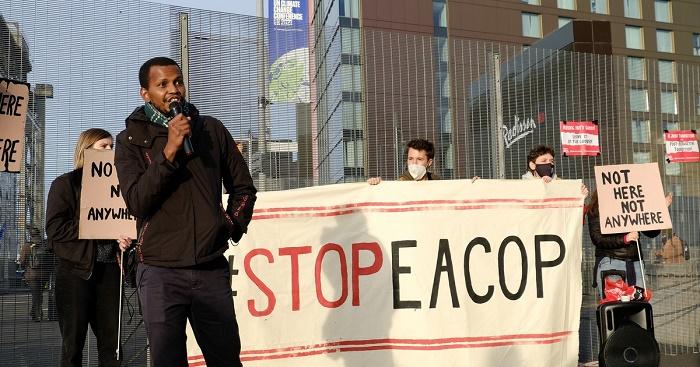Faridah N Kulumba
Africa-Press – Uganda. Uganda and Tanzania proceeded along with the planned joint oil pipeline set to transport crude oil from Uganda to the international market amidst the criticism by environmental activists who say that the project threatens the livelihoods of tens of thousands of people and fragile ecosystems in the hearts of Africa.
This followed the government of Tanzania to approve the construction license for a USD 5 billion East African Crude Oil Pipeline (EACOP) on the 21st of February 2023.
Tanzania’s approval happened several weeks after the government of Uganda approved the awarding of the construction license of the EACOP set to carry crude oil from the country to international markets.
Powers of approval
The construction approvals of neighboring countries mean the oil pipeline project is irreversible. According to the chief legal and corporate affairs officer at Uganda National Oil Company Peter Muliisa, license issuance is the green light for both countries to start transporting the equipment to the sites.
The license is subjected to conditions including securing all necessary consents and permits. Other conditions are, the EACOP Company shall establish the main control for monitoring the 1,143km duct from mid-western Uganda to Chongleani terminal at Tanzania’s Indian Ocean Tanga port, and consulting and seeking approval from authorities for any deviation from the current pipeline route, among others.
Tanzania’s EACOP general manager Wendy Brown also added that the approval serves as permission for the commencement of the construction in the country.
Environmental groups criticism
Since the two East African countries signed agreements to build a vast regional crude oil pipeline from Lake Albert in western Uganda to the Tanzanian port of Tanga, the project incensed environmental activists that led the United Nations Parliament to intervene in this matter. The activists argue that it threatens to displace thousands of people and degrades critical ecosystems in the two nations.
In mid-September last year the European Parliament criticized the proposed EACOP, calling for TotalEnergies to consider an alternative route. The European Parliament was reacting to the grave concern around alleged human rights violations in Uganda and Tanzania, linked to the project.
According to the European Parliament, the EACOP project has led to the wrongful imprisonment of human rights defenders, the arbitrary suspension of NGOs, arbitrary prison sentences, and the eviction of hundreds of people from their land without fair and adequate compensation.
The EU Parliament tasked Uganda and Tanzania to launch efforts to ensure respect and compliance with human rights for the project to go ahead as planned. Europe also called for the Ugandan government to reauthorize 54 NGOs that had been arbitrarily closed or suspended. It also said Ugandan authorities should provide free and unhindered access to the oil zone for independent observers, from local groups to international observers.
Activists’ voices to the funders
On 22 February this year, human rights defenders, local communities, and environmental activists from Uganda under the Stop EACOP Coalition using the #The StopEACOP campaign, in collaboration with other activists from around the world raised their voices to pressure Standard Bank, Sumitomo Mitsui Banking Corporation (SMBC) and Standard Chartered, begging them not to fund the EACOP project.
The EACOP protest took place in 18 cities, including Kampala, London, Paris, New York, Tokyo, Johannesburg, Frankfurt, Brussels, Sendai, Hoima, Nagoya, Toronto, Fukuoka, Goma, Cape Town, Amsterdam, Copenhagen, and Vancouver.
The activists argued that the project does not comply with the Equator Principles – the industry benchmark for assessing, determining, and managing social environmental risk for project financing – to which these particular lenders are signatories.
On 15 May 2022, Deutsche Bank announced that it will not be providing dedicated finance to the planned EACOP project. Germany’s largest lender joined other commercial banks that have made commitments to avoid financing the USD 3.5 billion project.
The Deutsche Bank and other insurers pulled out of EACOP after environmental campaigners came out and objected to the project saying that it will displace thousands of families and disrupt nature reserves.
French multinational oil company Total is the project’s main proponent and stands to profit the most from the pipeline’s construction. Total will be working with China National Offshore Oil Corporation (CNOOC). Both giant companies hold the licenses to extract oil in Uganda, but can only begin drilling once EACOP is built – it’s the only way to export the oil out of landlocked Uganda, to be processed and sold around the world.
The construction of the longest crude oil pipeline in the world is expensive work, and that is why Total and CNOOC need the investors and other actors around the world like commercial banks, public financiers, contractors, and insurance providers to support them.
Uganda’s promises
Uganda says that the activists should not be concerned with the pipeline construction because the line will be buried, covered, and vegetation restored, allowing cultivation on top of the 30-meter-wide corridor.
The EACOP company executives have continued to keep their promise of putting efforts to ensure compliance with human rights. Acquisition of the project rights of way, including compensation to affected persons, is continuing on both sides of the border.
But on the other hand, the activists believe that the project risks poisoning the water resources and wetlands of Uganda and Tanzania. Including the Lake Victoria Basin, on which more than 40 million people depend for drinking water, food production, and their livelihoods. This will violate a multitude of human rights, the rights to life and safety, the right to health, the right to freedom and expression, assembly and association, and the right to free prior and informed consent.
In Uganda, the oil pipeline project has affected about 3,648 persons, of which only 206 are physically affected while 179 opted for their houses to be rebuilt for them. Also, some 2,866 project-affected persons have signed compensation agreements, of which 2,468 have so far received their cash compensations for their land or crops.
In Tanzania, there are 9,510 project-affected persons, of which 96 percent or 9,111 persons have signed compensation agreements out of which 8,672 persons have received their cash compensations. The Tanzania section runs for 1,147km through 25 districts and eight regions.
For More News And Analysis About Uganda Follow Africa-Press






